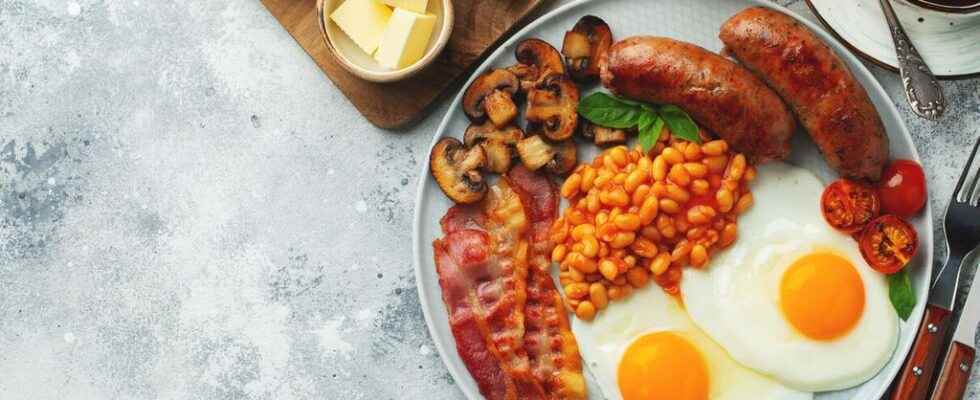To vary the pleasures and discover new flavors, why not take inspiration from breakfasts from elsewhere? To take only the best, we follow the advice of Dr. Laurence Plumey, a nutritionist.
German breakfast
Its composition: Black coffee, cheese, cold cuts (ham, pâté, sausages, mortadella), black bread.
Good ideas to keep: eating cold meats and cheese for breakfast can be a good idea. Calories in the morning are burned faster than those in the evening and this type of meal also makes it possible to last 5 to 6 hours without feeling hungry, which is an advantage in the event of a late or “quick” lunch.
Black bread, rich in fiber, magnesium and group B vitamins, is extremely satiating and lowers blood sugar.
>> The advice of the nutritionist: cold meats and cheese are relatively high in calories. We therefore avoid eating it again during the day. We favor less fatty foods by preferring to pâtés and sausages, which contain 30% fat on average, ham and its 3 to 6% fat. We also avoid adding butter to the bread before placing the cheese there.
Moroccan breakfast
Its composition: wheat flour pancakes soaked in olive oil, argan oil or spread with blanched almonds and honey. Mint tea or coffee with milk.
Good ideas to keep: olive oil (rich in omega 9, antioxidants) or argan (the richest in vitamin E, very antioxidant) is excellent for health. Almonds (plain, toasted), sources of omega 9, vitamin E and fiber, can be eaten at a rate of about twenty per day. Café au lait is very popular in the Maghreb and provides calcium.
>> The advice of the nutritionist: this type of breakfast can quickly become too fatty, too sweet and too high in calories. We prefer pancakes with wholemeal flour (they increase blood sugar less quickly and satiate permanently). We limit ourselves to one tablespoon of olive or argan oil per day because, like all other oils, they are very high in calories (100 kcal per tablespoon).
A teaspoonful of honey a day is more than enough. We add a little sugar to our tea and add a glass of orange juice for the vitamins.
English breakfast
Its composition: milk tea, orange marmalade, fried eggs with bacon, buttered toast, glass of orange juice.
Good ideas to keep: it is a real small complete meal rich in energy (eggs, bacon), source of calcium (milk) and vitamin C (orange juice).
>> The advice of the nutritionist : this type of meal can quickly become too caloric. We therefore opt for lean bacon (3% fat), we cook the fried eggs without frying them in an excess of oil and, if they are scrambled, we replace the butter with 15% light cream. by MG.
Russian breakfast
Its composition: kasha, porridge of cereals (buckwheat, oats, wheat or millet) and milk (goat or cow), tvorog (fresh Russian cheese), jam, cold meat, fried eggs, blinis. Very strong tea.
Good ideas to keep: this breakfast is energetic, which is useful for facing very energy-intensive situations (severe cold, physical work, etc.). Rich in proteins (meat, eggs, dairy products), lipids (fat) and carbohydrates (blinis and cereal porridge), calcium (fresh cheeses and various milks), it satisfies durably.
>> The advice of the nutritionist: if this breakfast is not too fatty or not too sweet, it is perfect. It’s almost an early lunch, to which you should add fruit rich in vitamin C. If you opt for this formula, you will have to eat light for lunch – while being careful not to make up for dinner afterwards. , otherwise assured weight gain.
Japanese-style breakfast
Its composition: a miso soup, a bowl of rice accompanied by nattō (fermented soy beans), grilled fish.
Good ideas to keep: energy comes mainly from rice (which replaces our bread), oily fish provides protein and omega 3. Soy beans provide excellent protein of vegetable origin and soup is the equivalent of our coffee or tea .
The nutritionist’s advice: this breakfast can quickly become too salty. It is therefore recommended not (or little) to add salt to the dishes for the rest of the day. Ideally, it should be supplemented with a kiwi or citrus fruit for the supply of vitamin C.
Find out more:
Read also :
Loading widget
Subscribe to the Top Santé Newsletter to receive the latest news for free
